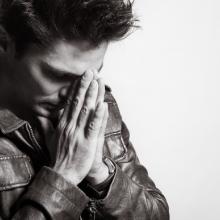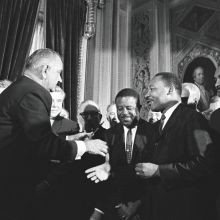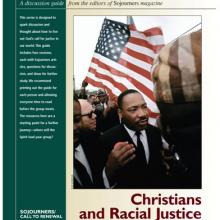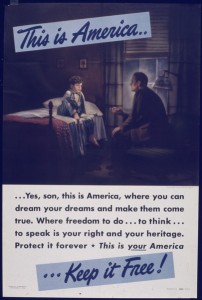Repentance
We’re a few weeks into 2015, which means many of us are striving to keep our New Year’s resolutions while others have already seen their best intentions collapse under the pressure of daily routines. Every year, we make promises to be better — we’ll go to the gym, save more money, slow down. But for Christians, every day is an opportunity to make resolutions. We call that repentance.
And this year — today — I am repenting of my dependence on fossil fuels.
While many associate repentance with sorrow or guilt, the biblical meaning of the word is to stop, turn around and go in a whole new direction. Repentance means changing our course and embarking on a new path.
For Christians, humanity’s failure to care for God’s creation warrants our repentance. This is not just a theological claim but a practical moral imperative when it comes to fossil fuel consumption. American Christians need to repent — and quickly!
Our society’s addiction to fossil fuels has had an unconscionable impact on the state of our Earth and on future generations. Coal-fired power plants are giving people cancer and asthma. Oil pipelines are spilling and destroying sacred lands. Natural gas fracking waste is leaking underground, threatening water sources. Through our consumption of coal, oil, and gas, we have enabled this toxic activity.
I attended Catholic school for one year as a child. My second-grade year in Philadelphia’s St. Athanasius left me with a strong sense of the mystery of the church. The most mysterious space there was the confessional booth. I wasn’t allowed to enter because I wasn’t Catholic, so I just sat and watched others enter with pinched brows. Then they would exit with peace painted over their faces.
There is a scene in the book Blue Like Jazz where author Donald Miller sets up a confessional box in the center of the Reed College campus. But Miller’s confessional worked in reverse. Students of Reed, which is known as the most liberal campus in the country, entered the confessional booth with curiosity, cynicism, skepticism, or worse — to disprove this thing called Christianity. But what they encountered upon entry was disarming — even healing. Rather than prompts to confess their sin, Miller sat on the other side of the veil and confessed of the sins of the church. This was a revolutionary act in the context where, according to Gabe Lyons and David Kinnaman’s modern classic, UnChristian, the general consensus about Christians is decidedly negative.
“If my people, which are called by my name, shall humble themselves, and pray, and seek my face, and turn from their wicked ways; then will I hear from heaven, and will forgive their sin, and will heal their land.” —2 Chronicles 7:14
Confession and repentance are messy and painful, and they don’t come natural to us. Our human heart is in a natural state of denial. Without an external agent, God, we are unable to recognize our prejudices, offenses, and sins.
In the previous text God speaks to God’s people, those whom God claims as God’s own. We belong to the Creator and to each other. That means that regardless of how we perceive others, and regardless of how others perceive us, bonds that can’t be broken tied us up. The relationship we share is held together by the very identity of God. Mother Teresa reminded us “we have forgotten that we belong to each other — that man, that woman, that child is my brother or my sister.”
It is necessary that we understand that this belonging is mutual. I belong to you and you belong to me. There is no escape; we can’t change this relationship. It is only when I recognize others and welcome them into my life that the fullness of God’s identity in me is revealed. No one is an outsider. No one should be left out at the door of my heart; to do so is to deny my God-given identity.
Often we do not know how our words and actions affect and harm others. However, ignorance is not an excuse. As the body of Christ, we must be willing to look deeply at the implications of the choices we make. When those choices cause harm – intentionally or unintentionally – we must repent and ask for forgiveness.
Forgive Us: Confessions of a Compromised Faith was a cry from my heart and the hearts of my coauthors as we wrestled with what it means to be the church of “Good News” in the 21st century. So many people do not see the evangelical church from that perspective. The church – rather than being Good News – is often a painful place where broken people, judgment, and criticisms prevail.
“Get the word out. Teach all these things. And don’t let anyone put you down because you’re young. Teach believers with your life: by word, by demeanor, by love, by faith, by integrity.” –1 Timothy 4:12 (The Message)
In our recent book Forgive Us: Confessions of a Compromised Faith, Mae Cannon, Lisa Sharon Harper, Soong-Chan Rah, and I call the American church to a posture of repentance due to all the times we have not only been on the wrong side of history, but on the wrong side of God.
As an organizer and director of the AMOS Project in Cincinnati, I’ve discovered that a humble spirit of repentance is critical to powerful work around racial and economic justice. There can be a strong temptation to replay colonialism by having all the answers and believing we are God’s gift to the oppressed. We white evangelicals are particularly susceptible to this arrogant path. Humility and a repentant spirit are key to a healthy engagement and partnership in our work.
For most folks, these names will not mean much: Eric Pizer, Christopher Barber, and Andrew Harris.
They are names that may have a bit resonance in Wisconsin, where I am from. What they represent, though, are the struggles we face as a society dealing with concepts of repentance and redemption. They represent the way those concepts get overrun by politicians seeking to exploit the public’s fears. We as a people, after all, do not seem to be in a very forgiving mood these days.
So the distinctive stories of these three Wisconsin residents might offer a good starting point for Christians thinking about what our faith tradition calls us to during this season of Lent.
Seven years ago this week, I had my “come to Jesus” moment.
That’s not to say that over the past few years I haven’t had many experiences in which I’ve come away wondering “did I ever really believe up until now?” Many of those moments were far more profound and life-changing. It’s just that for me, it’s where a certain chapter of my life began.
I was raised in a Christian tradition that prized altar calls and bowing your heads, closing your eyes, and raising your hands to be saved. There was a clear delineator of when you were “born again” and when you were not. It was a moment in history, not just a spiritual exercise.
I don’t totally disagree. I think that there is something significant about the moment you first say yes, the same way I can remember the first time my best friend and I stopped just being colleagues. Our friendship has had many more important moments, but going to see Alice in Wonderland after work on a rainy Monday evening in March was where it started.
But as I have persisted (persevered for you Calvinists) in this faith I’ve discovered more and more what a relationship with God is like. In order for it to work, as Martin Luther famously said, all of life must be repentance. Every day the choice to say “yes” and not “no, I’m so done with this” is just as significant, if not more because coming to Jesus is often easier than staying.
I’m asked pretty often what I see for the future of organized religion, and Christianity in the West in particular. Given the fact that I am in the process of completing a book called “ postChristian ,” some people make assumptions that I am convinced it’s all going away.
Granted, Christianity has experienced precipitous decline, and the drop-off likely is far from done. Before we see any leveling-off within the institutional church, there will be many more church closures, consolidation of shrinking denominations, and an increasing number of people called to, and already working in, ministry who supplement their income with some non-ministerial side vocation.
So what do we, who still operate within the system of a declining religion, do about our situation? Some of this has little or nothing to do with anything the church has done or can do. Our increasingly distributed, decentralized, and accelerated culture has forced churches out of the center of American social life. Also, changing cultural norms have made it much more socially acceptable not to go to church.
I’ve long suggested that many of the folks filling the pews during the so-called heyday of the Church some 40 to 60 years ago were there under some duress. They went because of community pressure to do so, because their spouses made them, or because it was a great place to do business networking. But honestly, were we any better off as a faith to have our buildings full if the folks who were there didn’t really want to be there?
IN OCTOBER, Sojourners hosted a Washington, D.C. premiere for the faith community of the extraordinary film 12 Years a Slave. The compelling story about Solomon Northup—a free man from New York who was kidnapped and sold into slavery—is an accurate and well-produced drama, worth seeing for its cinematic merits, but primarily as a start to a conversation about race in America that is long overdue.
In her New York Times review titled “The Blood and Tears, Not the Magnolias,” Manohla Dargis wrote that 12 Years a Slave “isn’t the first movie about slavery in the United States—but it may be the one that finally makes it impossible for American cinema to continue to sell the ugly lies it’s been hawking for more than a century.” The film reveals how morally outrageous the slave system was, and it is very hard to watch.
The enslavement of millions of people of African descent by white Americans was always violent, and too intense for most white people to really accept the truth. Most white people, white Christians, and white churches tolerated slavery for 246 years. This historically horrendous evil existed because we tolerated it. That’s why evil always continues to exist: because we tolerate it.
What do we tolerate today? We tolerated the gratuitous evil of slavery, and still tolerate the devaluing of black lives. We tolerate completely dysfunctional urban schools, but would we still do so if they were full of young white children? We tolerate a criminal justice system where the racial disparities between white and black arrests, convictions, and sentencing are abundantly clear, resulting in the mass incarceration of men of color. We tolerate murder rates for people of color that we would never tolerate for whites. We tolerate racial profiling of young black men, with results that we would never accept for our white teenage boys. And we tolerate deliberate and clear political efforts to diminish the votes of minority communities.
BACK IN THE day, when Stevie Wonder was Wishing “those days could come back once more,” my 6-, 7-, and 8-year-old friends and I had no idea what the heck he was talking about, but we loved the groove and would blast Wonder’s Songs in the Key of Life album from our front steps as we played in front of my house in our West Oak Lane neighborhood of Philadelphia.
Sometimes the boys would coast down the street on handmade skateboards, literally made of old skates—the kind with wheels you strapped to your shoes—nailed to short wooden planks. Sometimes the girls and boys would race each other down a steep street, flying at lightning speed on bikes and boards, to see who could make it first to the candy shop at the bottom of the hill. And sometimes, in all the play, a verbal sparring match would break out:
“You so big,” one friend would say, “it take two showerheads to clean yo big butt in the morning!” Then the 7-year-old sparring partner would come back: “Oh, yeah?! You so ugly, yo mama say ‘What dat?’ when she give birth to you!”
It would keep going and we’d all laugh out loud until someone got inappropriate. Usually inappropriateness began with three words: “Yo mama so ...” We all knew to never bring someone’s mother into the sparring match unless you wanted to fight for real. Those were fighting words.
This summer the Supreme Court got inappropriate. They spewed fighting words on the playground that is our national public square.
BACK IN 1990, the Presbyterian Church (U.S.A.) issued this warning: "The religious community must ... take seriously the risk of idolatry that could result from an unwarranted fascination with guns, which overlooks or ignores the social consequences of their misuse." Two decades later, about 660,000 more Americans have been killed by guns, with a million more injured.
These figures convince me that what was a risk in 1990 has become our reality today: For too many, guns have become idols. They claim divine status; make promises of safety and security they cannot keep; transform people and neighborhoods; create enemies; and require human sacrifice.
Not all gun owners have permitted their guns to become idols or absolutes. In fact, a recent poll shows most gun owners and NRA members, in contrast to public perception, believe personal freedom and public safety are complementary, not contradictory. But those few who hold the microphone at the NRA (the wealthy manufacturers and the gun zealots who do their bidding) have permitted their fascination for guns to supplant God and God's requirements for human community.
An idol's followers boldly claim divine status for it. Former NRA executive Warren Cassidy was clear when he boasted, "You would get a far better understanding [of the NRA] if you approached us as if you were approaching one of the great religions of the world." Not to be outdone, Charlton Heston, during a speech as NRA president, intoned, "Sacred stuff resides in that wooden stock and blued steel—something that gives the most common man [sic] the most uncommon of freedoms, when ordinary hands can possess such an extraordinary instrument that symbolizes the full measure of human dignity and liberty."
“TAKE OFF THE garment of your sorrow and affliction, O Jerusalem, and put on forever the beauty of the glory from God. Put on the robe of the righteousness that comes from God; put on your head the diadem of the glory of the Everlasting” (Baruch 5:1-2). We might occasionally hear in church a prayer that makes passing use of the phrase “the beauty of holiness,” but it can’t be claimed that we are helped very often to feel that the contagious goodness of God is absolutely lovely, alluring, and attractive. We are called to be beautiful human beings. Christians who are deeply serious about social justice, who carry the burden of the world’s brokenness in their hearts, who are committed to political dissent, probably need this reminder most of all. We can hardly be agents of change if our faces are disfigured by disgust and anger.
Advent may be an especially important time to listen carefully for the Word who summons us to be walking sacraments of God’s radiant beauty. Paul will speak to us about having joy in one another and clothing ourselves in love. We are meant to fill our imaginations in these weeks with the sight of Mary in the radiance of her final days of pregnancy. Doesn’t her beauty lend all the more power to her proclamation, “[God my savior] has brought down the powerful from their thrones, and lifted up the lowly; has filled the hungry with good things, and the rich sent away empty” (Luke 1:52-53)?
Trayvon Martin's slaying has ignited a national discussion on race and privilege.
Many of us recognize that Trayvon’s untimely death is not an isolated incident.
Racial profiling. Discrimination. Enmity. Suspicion. Intimidation. Fear. Hate.
For far too many Americans, these are everyday realities.
As Christians, we are called to fight injustice and work to heal the broken systems — and broken relationships — of the world. We act, with Jesus Christ, to bring about reconciliations — between people, people groups, communities; within (and between) organizations, institutions, and social systems.

Ashes to Ashes image via Tim/Wylio. (http://www.wylio.com/credits/Flickr/4366100883)
Repentance has a public aspect and a private aspect. Jesus speaks very clearly about doing one’s repentance in secret -- not chattering on in public about how hungry your pious fasting has left you. At the same time, the church also has a ministry to call -- publicly -- for repentance, to sometimes play the role of John the Baptist. Calls for repentance happen every week, every day, inside religious buildings, inside religious communities. Sometimes calls for repentance need to happen out on the street corners, too.
Still, this is a strange thing to do, this liturgy outside a hospital. It does not feel entirely comfortable to me -- but I am not sure anything about Ash Wednesday ever feels entirely comfortable.

"Penance." Image via Wylio, http://bit.ly/wo6sWJ.
On Ash Wednesday, Catholics and many others will walk around with ashen crosses (or, by the end of the day, what look like indeterminate smudges) on our foreheads. Those ashes are strong symbols of core principles of the Catholic faith — symbols of repentance, identity, reconciliation, and renewal of baptism in the faith.
As a voting rights lawyer who is about as passionate about my work as I am about my faith, I can’t help but see parallels between the moral guidance I am given by my faith, and the policy choices that confront us in the secular world. These principles are reflected in the way we worship – and also in the actions we take in the secular world. This has led me and others to the conclusion that the 4 million Americans who lost their voting rights while incarcerated, and now live in our communities, deserve the chance to vote again upon release. It is both the just and the moral thing to do.
As we approach Ash Wednesday during this Holy Season, I encourage all Christians, guided by their core beliefs, to consider this idea.
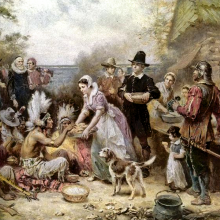
The First Thanksgiving by Jean Louis Gerome Ferris via Wiki Commons (http://bit.ly/6NVSwe)
I’m not suggesting we not be thankful. But if it were up to me, I’d repeal the official day of Thanksgiving that was sanctioned by Congress because no matter how we want to re-tell or re-write that story, we are marking an event of injustice.
In removing this day, I’d encourage the whole country to express sorrow for such a grave injustice to the Native Indians and create events and various forms of curriculum in parallel. I’d express gratitude and celebration of the story and legacy of the native Indian people. And I’d put into law that ensures reparation for every single descendant of Native Indians. Furthermore, I’d create a fund to guarantee 100% funding to college for any descendants of Native Indians. This is just for starters….
In my opinion, our treatment of the Native Indians is one of the greatest human tragedies and to ignore its story and context may be the pinnacle of historical revisionism.
Nearly 50 million Americans are currently living below the poverty line (that is $22,000 for a household of four) and half of them are working full time jobs.
In our current economic system, the "happiness" of the super-elite is secured while the lives, liberty, and access to basic needs of the rest suffer. This isn't the American Dream and it isn't God's dream either.
If justice is only an implication, it can easily become optional and, especially in privileged churches, non-existent. In the New Testament, conversion happens in two movements: Repentance and following. Belief and obedience. Salvation and justice. Faith and discipleship.
Atonement-only theology and its churches are in most serious jeopardy of missing the vision of justice at the heart of the kingdom of God. The atonement-only gospel is simply too small, too narrow, too bifurcated, and ultimately too private.
Yesterday afternoon I found out that ABC news plans to dedicate it programming today to "Hunger at Home: Crisis in America." It precipitated my writing of this post which I had planned to add as a later addition to a series on tools for prayer.
One important item in our prayer toolkit is knowledge of our hurting world. Not knowledge for the sake of knowledge, but knowledge that equips us to respond. Becoming aware of the needs in our world can lead us into a deeper understanding of the ache in God's heart for our hurting friends and neighbors. It can also connect us to our own self-centered indifference that often makes us complacent when God wants us to be involved. And it can stimulate us to respond to situations that we once felt indifferent to.






